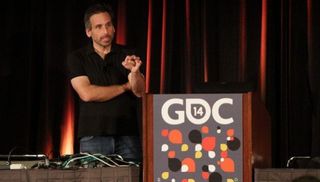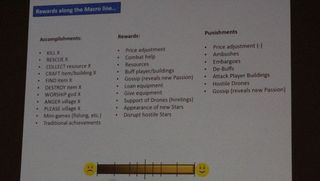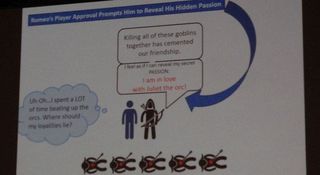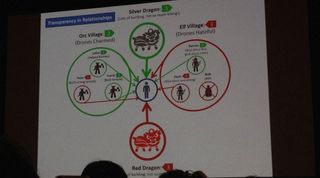Ken Levine outlines his system for replayable narrative in games

Ken Levine's been working on what he calls 'linear narratives' for 19 years, most recently in BioShock Infinite. In February, his studio Irrational closed and Levine left to start a new game with a smaller team, focusing on making something story-driven but replayable. At the Game Developers Conference in San Francisco on Friday, he gave a talk to explain what he means by that, and to lay out the basics of a system he thinks might be able to achieve it.
I'll skip the preamble about the limitations of linear stories in games and get straight to the system he actually described. Since he's not ready to announce an actual game, he took the basic format of Skyrim as an example to work with, and explained how his system might work in that world.
This example game world would have factions: orcs, elves, dwarfs, humans. Each faction might have a town, and they'd be populated, but mostly with what Levine calls Drones: NPCs who all behave the same. But each village would have something like five Star characters: these are the ones the system aims to flesh out.
What defines a Star character is that they have several specific passions in life. Bob the Orc's first passion is hating elves, his next is wanting a temple to the elder gods, and his third is lusting after Barbara the orc. Everything you do as a player that helps or hinders those goals earns you some love or hate with Bob. The sum total of how you've affected all his passions gives him an overall disposition towards you, and at certain thresholds he'll do you favours: discount in his store, lackeys to help on a quest, etc.

Naturally Stars have conflicting Passions, so helping one will usually annoy at least one other. And Stars within the same faction can have Passions that go against their faction's defaults: Juliet the Orc is in love with Romeo the Elf, where most of her kind hate Elves unilaterally.
Most of this system would be made apparent to the player, so you know what a character's passions are and you know where you are on their approval meter. But they might also have secret Passions, like Juliet's forbidden love, that they'll only tell you about once they trust you enough.

The names and voices and personalities of these Stars would be the same each time you play, but their Passions would be randomly chosen - Levine said they might write script and record VO for ten different Passions Bob could have, but he'll only have three of them in any given playthrough. They'd still be a different set of possibilities to everyone else - he'd never have one that goes against the broad strokes of his character.
The biggest gaming news, reviews and hardware deals
Keep up to date with the most important stories and the best deals, as picked by the PC Gamer team.
Reaching certain levels of approval with certain characters would trigger an Event. These would have some pre-written, crafted story to them - staying as derivative as possible, Levine suggested a horde of white zombies might descend from the north. That gives everyone a new Passion - fear of zombies - and that might affect your relationship with them depending on how you deal with it.

The idea is to make sure that the game is different each time, that the narrative is driven by the player, and that it's apparent to the player how their actions are driving it. And I think this system checks all those boxes. But in this intentionally generic world, with these intentionally generic examples, it couldn't help but sound rather dry, and rather familiar. Fantasy might have been a bad context to pick, since so many RPGs already do have character disposition bars and already do have people change their opinion of you based on how your actions relate to their preferences. Adding three sub-bars can add some character and specificity, but in its barest form it's not terribly exciting.
A game made to the principles of this system would at least be interesting. Letting these interacting, clashing preferences take center stage is fairly unusual, and mixing that with the kind of imaginative setting Levine usually works with would help a lot. It's not surprising that Levine thinks this system will be fruitful and interesting once it's in a good game, but it's surprising that he'd give a talk about it in the abstract, when the abstract is not that compelling.

Palworld studio's first move as a publisher is to save a struggling indie dev: 'This is the energy I want to see driving games in 2025'

Yakuza/Like a Dragon creator Toshihiro Nagoshi says his studio's new game won't be that big after all: 'it's not modern to have similar experiences repeated over and over again'
Most Popular







